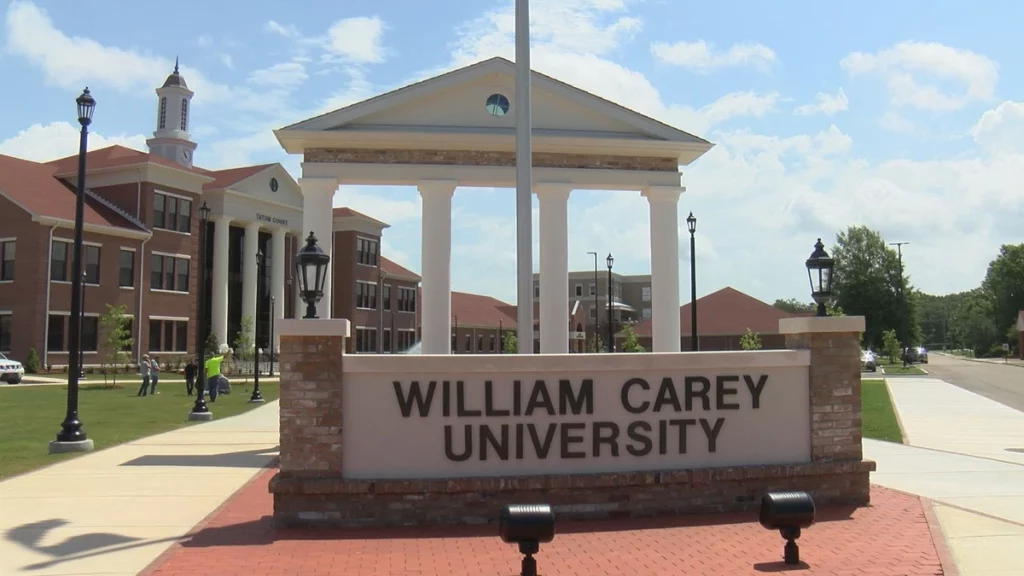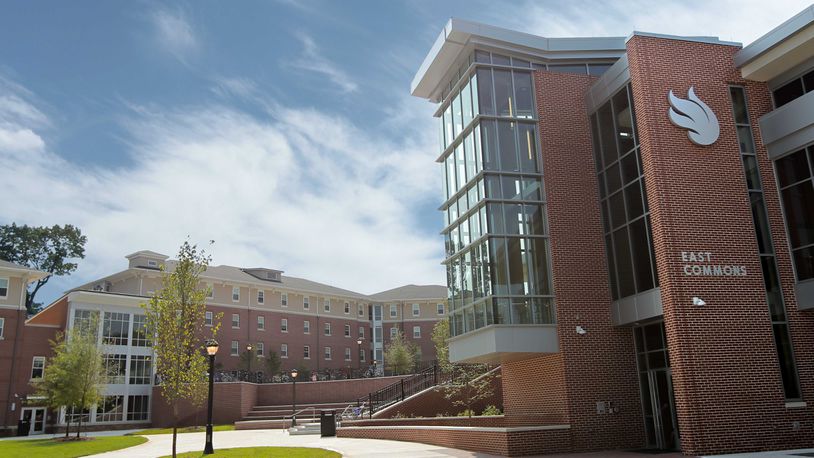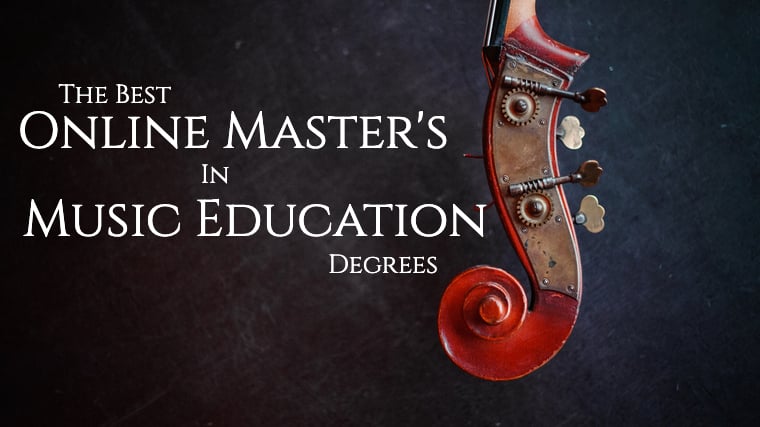| Rank | School | Location |
|---|---|---|
| 1 | Boston University | Boston, Massachusetts |
| 2 | University of Missouri-Columbia | Columbia, Missouri |
| 3 | University of Georgia | Athens, Georgia |
| 4 | William Carey University | Hattiesburg, Mississippi |
| 5 | Georgia College & State University | Milledgeville, Georgia |
| 6 | University of West Georgia | Carrollton, Georgia |
| 7 | University of Nebraska-Lincoln | Lincoln, Nebraska |
| 8 | Texas Tech University | Lubbock, Texas |
| 9 | University of South Florida-Sarasota-Manatee | Sarasota, Florida |
| 10 | Florida International University | Miami, Florida |
This ranking of the the best online Master's Degrees in Music Education is designed for online graduate students to make informed college and degree decisions.
About This Ranking
Our ranking is formulated for students to make the best and most informed degree and college decisions. This ranking focuses on online master's programs at universities across the U.S., both public and private.
Our ranking formula uses data from the National Center for Education Statistics, and data about the academic influence of these schools (from faculty and alumni) in publications. For more information about our methodology see our College Calculator.
Your next step is learning about the top online Master's in Music Education programs available.
How can you choose with so many options? We've narrowed down the list to ten universities offering the best Music Education master's degree online programs.
What is an Online Master's Degree in Music Education?
Master of Music Education programs online teach students how to teach students from elementary school through college (perhaps as an associate professor). Graduate degree program students typically complete 32 credit hours to graduate. Most graduate programs can be completed in in 18 - 24 months.
Students taking an online master's in Music Education learn the skills necessary to become effective music educators. Music education students learn music skills, such as music theory, and effective teaching techniques and strategies. In short, master's in Music Education teach students music and how to be a music teacher.
Music is always created within a cultural and historical environment. As such, these programs also teach the cultural and historical aspects to music. Through these and other educational contexts, students better understand the nature and origin of different kinds of music.
Music Education and Musician Salary Information
Here are the salaries to asses a master of music education worth.
| Careers | Median Salary |
|---|---|
| K - 12 Music Teachers* | $41,620 - $60,233 |
| College Music Teachers** | $46,584 |
| Music Composer*** | $106,368 |
| Music Tutor/Music Instructor**** | $49,466 |
| Source: *ZipRecruiter, **PayScale, ***Comparably, ****Salary.com |

Ranking Methodology
This Best Online Master's Degrees in Music Education ranking was created using Successful Student's ranking algorithm. This algorithm uses the following data points to calculate a school's ranking placement:
- Retention rate
- Desirability (number of applicants)
- Percentage of students who are fully online
- In-district average tuition for full time graduates
- In-state average graduate tuition
- Academic influence
| Online Graduate College | Ranking Criteria | Weight |
|---|---|
| Retention Rate | 20% |
| Desirability (Number of Applicants) | 20% |
| Graduate Fully Online Enrollment | 10% |
| In-District Average Tuition Full Time Graduates | 10% |
| In-State Average Graduate Tuition | 10% |
| Academic Influence | 30% |
The Best Online Master's Degrees in Music Education
Boston University
Boston, Massachusetts

Boston University offers the Master of Music in Music Education degree online.
Students may choose from 15 elective courses, which allows for tailoring the master's degrees towards certain interests. Boston offers a Music Technology focus, which is comprised of three courses, and which qualifies students for Level 1 certification through the Technology Institute for Music Educators (TI:ME).
Selection of courses:
- Power, Marginalization, and Privilege in Music Education
- Introduction to Music Technology
- Toward a 21st-Century Aesthetic of Musicking
- Contemporary Issues in Music Education
- American Music
- Music Technology Pedagogy
- Qualitative Research Methods
- Special Topics in Music Education Technology: Notation with Sibelius
Program Length: 18 - 24 months. Students usually take two courses in succession per semester (one class at a time). Each course is 7 weeks long.
Boston University's online Master's in music education program equips grads to educate infants through geriatric populations. BU's music faculty specialize in lifespan engagement, community music facilitation, early childhood music education, and music technology.
Graduates of this program need to complete a total of 32 credit hours.
Students' 32 credit hours need to include four music theory credits, 12 credits in music education courses, and 16 approved elective courses.
Most students complete this program in 18 to 24 months.
Applicants to this program must hold a bachelor's in Music or Music education from an accredited institution. The program requires applicants to have current or recent classroom teaching experience and a 3.0 or higher GPA.
Each credit for Boston University's Online Master's in Music Education program is $955. The application fee is $95.
Boston University's Online Master of Music in Education Program is National Association of Schools of Music (NASM) accredited.
University of Missouri-Columbia
College of Arts and Science, School of Music
Columbia, Missouri

University of Missouri-Columbia offers the online Master of Music Education in Music Education degree.
This degree is designed for current music educators to teach in public schools, private schools, charter schools, national and international music programs, and community college.
The University of Missouri-Columbia has a Master of Music with an emphasis in music education program. This program is designed for music educators who want to further their knowledge and field studies. Those interested in career advancement should also check out their Master of Music Degree.
Graduates in this program will study the latest techniques and research in music pedagogy and instruction.
This program uses a semester-based calendar system. Graduates must complete a total of 32 credits to complete a Master's in Music with an emphasis on education degree.
The Master's in Music Ed. program requires 15 credits of music education courses. Students will complete 9 credits in music theory and history, 4 credits in teaching practicums, and 4 research-to-practice capstone credits.
Graduate students working full-time can take two courses per semester and complete the program in three years (including summers).
This Master's Program is 100% online. No campus visits are required throughout the duration of this program.
Applicants for this program must hold a minimum GPA of 3.0 or higher from a regionally accredited institution. The program requires a prerequisite bachelor's in Music Education or a teaching certification.
The estimated tuition for the Master of Music program for the 2022-2023 academic year is $16,832.00. The tuition and fees is $526.00 per credit hour.
Accredited by the National Association of Schools of Music (NASM). The University of Missouri also holds an accreditation from the Higher Learning Commission.
University of Georgia
Hugh Hodgson School of Music
Athens, Georgia

At the University of Georgia's Hugh Hodgson School of Music, students can earn the online Master of Music Education degree. Students in this program can emphasize in choral, instrumental, or general music.
Graduates of this program must complete 33 credit hours. A maximum of 6 transfer credits may be accepted.
All students of this online-only program have access to all available University online resources and technical support. Lessons are segmented and have clear and aligned objectives.
Those interested in applying for this program should hold Bachelor's from an accredited institution, and be accepted by The University of Georgia's Graduate School. This Master's in Music Education Program requires the following:
- Baccalaureate degree in music education from an accredited institution
- Certification to teach in a public or private K-12 school or be eligible for certification, or hold equivalent competencies
- Hold a 3.0 or higher GPA in their undergraduate work
Full tuition costs for the online Master's in Music Education program is $23,145.00. This includes online $629 per credit hour ($20,757 for 33 credits); student fees of $579 per semester ($2,388 for 4 semesters).
This program takes one year and two months to complete, including two summer sessions. This program begins with a summer session.
Accreditation is granted by the Southern Association of Colleges and Schools Commission on Colleges to award baccalaureate, masters, specialist, and doctoral degrees.
William Carey University
Hattiesburg, Mississippi

William Carey University offers the online MME in Music Education degree.
William Carey University offers a fully online program for educators who wish to advance their skills and knowledge in a Christian environment. Students will grow in pedagogical expertise and musicianship. This program equips graduates to apply for an advanced teacher's license (AA) for teaching music.
Graduates must complete 30 credit hours. This includes 15 credit hours of major area courses, 9 hours in other music courses, and 2 elective hours. Students must also complete a final project and a comprehensive exam.
An online MME degree from can be completed in one calendar year.
Enrollment Options:
The MME is a distance learning program.
Admissions and Transfers:
Applicants must hold a bachelor's from an NASM accredited institution. Transfer students can have a maximum of six transfer credits. Transfer courses must be six years or newer and graded "B" or higher.
Two consecutive terms of six or more credit hours qualify students for residency status with the online MME program.
Tuition for this online music Master's degree program is $500 per credit hour. Check out the Tuition & Fees page on the University's website for additional fees associated with graduate and online programs.
A variety of financial aid options are available.
Accreditation is granted by the Southern Association of Colleges and Schools Commission on Colleges.
Georgia College & State University
Milledgeville, Georgia

Georgia College & State University offers an education-specific Master in Music Education degree (MMEd) program. Graduates can select specialties in elementary, choral, or instrumental music education. This program offers graduates the opportunity to leave as mentors and policymakers in music education.
Graduates of GCSU's MMEd program must complete 30 course study hours. A published or presented capstone project is a requirement of this program. Graduates must also pass written and/or oral comprehensive exams to earn their MMEd.
Students in this program take courses like American Music and Politics and Community and Philosophical Music Perspectives. This MMEd program is divided into music, music education, and elective areas.
Applicants to this program must hold an accredited bachelor's degree in Music Education.
This Master of Music in Education has a tiered tuition system. One credit hour for the 2022-2023 online program is $320.50. While 18 credit hours of the online MMEd program is listed as $5,249.
GCSU holds accreditations from the National Association of Schools of Music, the National Association of Schools of Public Affairs and Administration, and the National Council for Accreditation of Teacher Education.
University of West Georgia
Carrollton, Georgia

The University of West Georgia offers a Master's in Music Education, designed to prepare its graduates to pursue higher education teaching positions and/or doctoral studies.
Students in the Master's in Music Education program will benefit from instruction with music educators from around the country. All studies are grounded in philosophy, research, history, theory, current trends, and professional application of these elements.
The Master's in Music Education program requires 30 credit hours. A maximum of six transfer credit hours may be allowed at the discretion of the school.
Students must take 21 credits of required courses and nine elective courses. Students can choose to write a thesis (3-9 credits).
Those applying to this Master's in Music Education program must have a baccalaureate degree in music education. Those without one must have an undergraduate degree in Music and a professional certification in Music Education.
Applicants must have an undergraduate GPA of 2.7 or higher. In addition, potential students must pass a diagnostic exam with a 60% or higher score. The exam consists of music theory, music history, aural identification of music styles, and aural theory.
Financial Aid is available for students who qualify.
Accredited by the National Association of Schools of Music and the Southern Association of Colleges and Schools.
The Master's in Music Education program is accredited by the National Association of Schools of Music (NASM).
University of Nebraska-Lincoln
Glenn Korff School of Music
Lincoln, Nebraska

University of Nebraska-Lincoln offers the online MAEd in Music Education degree.
Songwriters in pursuit of a doctoral degree can apply for the Master of Music research program (with a thesis).
Students who intend to teach PreK - 12 can apply for a practitioner Master of Music degree (no thesis).
Students on the thesis track must apply for admission to the school of music. The Glenn Korff School of Music MM degree program (thesis option) requires students to complete 30 credit hours.
Thesis option students complete 21 core course credit hours, 6 music credit hours, and 3 hours of courses.
Practitioner (non-thesis) track requires 36 credit hours of online programs. Courses include 18 core credit hours, 9 music credit hours (minor), and 6 credit hours of courses.
The thesis track meets online during summers and during the academic year.
Practitioner students may complete their coursework over summers only.
The Glenn Korff School of Music is accredited by the North Central Association of Colleges and Schools, the National Association of Schools of Music (NASM), and the National Association of Schools of Dance.
Texas Tech University
Lubbock, Texas

Texas Tech University offers two Master of Music Education Degree options.
The thesis track requires a 30-credit-hour course completion. Graduates of the non-thesis Master of Music Education degree must complete 36 credit hours.
Each online MME graduate student is required to take 3 specified music education courses, 1 choice musicology course, and 1 choice music theory course.
Texas Tech's Master of Music Education degree can be completed in person, online, or as a hybrid. Students may take courses in Fall, Spring, and/or Summer semesters.
Master of music students can choose between an asynchronous program or a live classroom model.
Texas Tech offers a dual enrollment track for Music Education undergraduate students who qualify. These students may take up to 9 dual graduate courses during their undergraduate degree. Those applying to the Master of Music Education program must be accepted to the school of music and the graduate school.
TTU is accredited by the Southern Association of Colleges and Schools Commission on Colleges to award baccalaureate, masters, and doctoral programs.
University of South Florida-Sarasota-Manatee
Sarasota, Florida

University of South Florida offers the online MA in Music Education degree.
USF's online Master of Arts in Music Education program offers education in technique, global education context, and research.
Graduates of the Master of Arts in Music Education program must complete 30 credit hours. This must include 9 hours of graduate electives and 21 hours of required music courses.
This program is online only and requires students to spend one week on campus to complete required projects.
No GRE is required for acceptance into this program. Applicants must have at least two years of teaching in a K-12 environment, a 3.0 undergraduate GPA minimum, and several other requirements.
USF holds an accreditation from the Southern Association of Colleges and Schools Commission on Colleges (SACSCOC) to award associate, baccalaureate, masters, specialist, and doctoral degrees.
Florida International University
Miami, Florida

FIU offers a Master of Science in Music Education online. This degree program will enhance students' musical and teaching abilities.
Graduates must complete 30 credit hours including 12 credits of music education, 6 credits of common core music classes, 9 personal focus, and three credits in research. Students who decide to complete a thesis may add 2 to 6 courses to their graduate program.
Students may complete this program online, in person, or as a hybrid.
Applicants must have a bachelor's degree in music, teaching experience, and a 3.0 or higher GPA. The admissions process for FIU's MS in Music Education includes audition videos, Skype interviews, and more.
FIU is accredited by the Southern Association of Colleges and Schools Commission on Colleges (SACSCOC) to award baccalaureate, masters, and doctoral degrees.
National Association for Music Education
Which Masters in Music Education Online Degree Is Right for You?
Are you looking for guidance in deciding among the many master of music education online programs? Masters in music education online are available as master of science and master of fine arts programs. The master of arts online programs are oriented towards the theoretical and artistic aspects, whereas the master of science online programs focus on technical and scientific elements of education programs in music.
Both are an advanced degree which can qualify graduates for a music teaching career, or music performance teacher.
Online Master in Music Education Program
Most graduate music education programs teach general music teaching methods and teaching practices, and prepare students in music theory, music history, and musical arts. Musical performance skills and adept scholarly writing are advanced skills that may give an advantage in the job market.
Music Theory
Music theory is the theoretical framework of musical notes and how they fit together. It's predicated on a general consensus as to what sounds good to the human ear. Online programs which include Music history courses help to explain the development of our western music system and the music theory behind it.
This includes music instruction in how twelve keys, the major scale, and how chords are built came to be and why. Music history is an important element of a music education degree program to get a full musical education. Music learning should include theory and history. Teaching music often includes these music proficiencies, whether teaching teaching music to children in early childhood or into adulthood.
Decide which online music education program fits you best.
Successful Student wants to help you pursue your music education online master degree. In person requirements depends on the online learning course requirements. Core courses can often be completed online. Academic excellence is maintained in the online courses throughout the online programs.
- The Top Music Schools & Conservatories in the U.S.
- The Best Online Master's in Music Business
- The Best Online Music Composition and Music Production Schools
Frequently Asked Questions
What can you do with a masters in music education?
Graduates of master's in music education can teach students from kindergarten through high school, and in colleges and universities (depending on the college or university). Graduates can also become private music instructors, and music composers. A master's in Music Education teaches students music and how to be a music teacher, which can open up many potential career paths in playing and teaching music. Graduates may also work at private music academies as a music teacher.
Do music teachers need a masters?
To teach at the K-12 grade school levels a bachelor's with a teaching certificate is all the credentials needed. A master's degree is not needed for employment in the K-12 teaching positions. However, a master's in Music Education is needed to teach music at the college and university levels.
Can you teach with a masters in music?
Yes, a master's in music does allow teachers to teach in K-12, community college, colleges and universities. Teaching at the college and university levels depends on the particular college or university. A master's in music does allow teaching at the K-12 levels.


